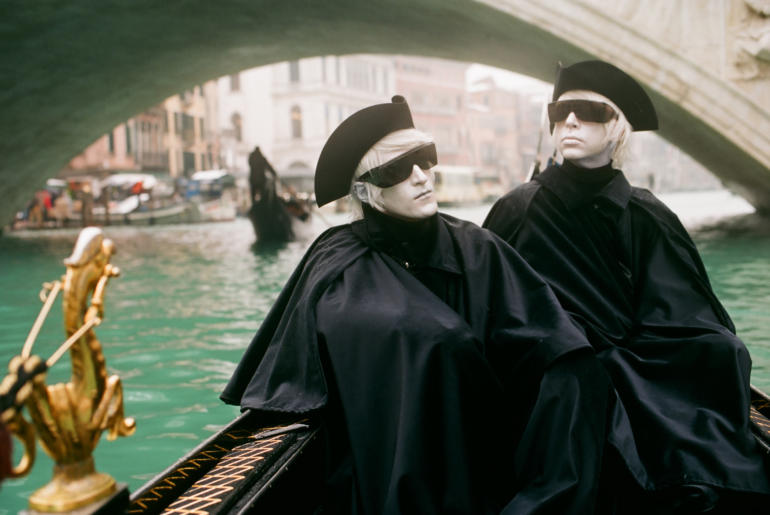My obsession with Drab Majesty began in February while researching new music to cover at the SXSW festival.
Walking home on a subzero midwinter night I listened to the 2017 sophomore album “The Demonstration” and was immediately captivated by the otherworldly stories contained in fan favorites “Dot In the Sky” and “39 By Design”.
My son had been born the previous October six days after my mum announced she had terminal cancer, so the confusing mix of elation on top of grief was maybe unconsciously pushing me towards this kind of imagery.
And the delicate guitar arpeggios shimmering over synth beats were irresistible for a middle aged Briton raised in the 1980s.
But it was hard to pin down Drab Majesty’s sound: it’s been variously labelled post-punk, shoegaze and all manner of waves, from new to cold or dark or even tragic wave.
But as I would discover, Drab Majesty is also intent on escaping labels to create something special and timeless.
And truly out there. Andrew Clinco launched Drab Majesty as a solo project while the drummer for Los Angels band Marriages.
Now a frontman, Clinco created the androgynous alter ego Deb Demure with a carefully cultivated aesthetic inspired partly by the cast of noirish misfits he would observe while taking the bus to visit his grandmother in Beverly Hills. Her baroque influences would feed right into his music.
Demure stood out immediately with Japanese Kabuki-style makeup and a shock blonde wig complemented alternately by a priest’s scapula or a Geisha kimono and, for “The Demonstration”, white robes nodding to Greek neoclassicism (a mini bust would rotate on stage during shows).
As Demure’s eyes retreated behind the makeup then disappeared behind sunglasses, the message remained consistent: identity – neither male, female nor even human – is completely suppressed behind music that invites Goth, indie and even metal fans across all genders.
Demure doesn’t even take credit for the songs, instead merely “receiving” the music from somewhere in the cosmos – debut EP “Unarian Dances” was inspired by inter-dimensional spiritual cult Unarius Academy of Science.
I was hooked and snapped up Drab’s entire catalog, beginning with 2015 debut album “Careless” that moves from “Foreign Eyes”, a jangly deep cut with John Hughes soundtrack written all over it, to the mesmerizing “Unknown to the I”.
Even the singles released between albums were indispensable: “More than A Mime”, a B-side duet with Dais Records label mate and folk artist King Dude, is the sound of two regal baritones dueling with each other to the bottom.
These gems filled a void before Drab’s third album, “Modern Mirror”, was released in July.
By now, the addition of keyboardist Alex Nicolaou (whose dad is, perfectly, horror director Ted Nicolaou) performing as Mona D, had changed the dynamic.
Written and recorded in Athens, “Modern Mirror” is a retelling of the Greek myth of Narcissus, the son of a God who fell in love with his own reflection.
Debut single “Ellipsis” – a reference to what Demure describes as the anxiety induced by texting and awaiting replies – contains the chorus “Two modern minds won’t say what they want to, To push a button in real time”.
It couldn’t be more timely when round the clock inter-connectivity is blamed for actually isolating us and driving the tribal impulses fueling right-wing populism.
Before the fragmentation of the music industry – indeed, If Drab Majesty had been an actual 80s band – at least half of “Modern Mirror” – including “The Other Side” and “Oxytocin”, Mona D’s effortless first run on lead vocals – would be summer hit singles.
And “Modern Mirror” is a brilliant pop album. Demure has rightly compared it to New Order’s “Technique”, another seemingly sunny dance classic that belies its anxious subject matter.
I had to leave SXSW before seeing Drab Majesty, but wasn’t going to make that mistake again once the current “Modern Mirror” tour began.
From the moment Demure and Mona D appeared on Washington DC’s Union Stage in a blast of dry ice against pink and blue neon and a backdrop of eyes peeping out over an oriental fan (reminiscent of the omnipresent TJ Eckleberg billboard in “The Great Gatsby”), it was clear the sound and aesthetic had undergone another evolution.
If “Modern Mirror” is a literary reworking, Drab’s whole catalog appeared to have been reinterpreted for the stage.
As Mona D sent wave after wave of bass and synth through the crowd, Demure drenched every track in reverb while picking away at those arpeggios, impassive and imperious in a silver lame suit and wraparound shades – with perhaps just the hint of a smile.
“Does anybody understand these times?” Demure wonders on “Out of Sequence”, the finale to “Modern Mirror”, before he and Mona D exited with “Kissing the Ground” from “The Demonstration” – a lasting reminder that trying to pigeonhole this band is futile.
In the hands of less talented and committed musicians it would be easy for the whole thing – UFOs, cults, wigs, lame suits and cravates and capes – to flop into kitsch.
Instead I cheered the fastidiously coherent vision and dedication to songs and style that ask urgent questions about identity and communication.
Since then, everything else has just seemed, yes, drab.
But I knew I had to rein things in when my long suffering wife caught me contemplating paying a $600 flight just to catch the band again in Chicago.
Better (for marital harmony, at least) to await the next incarnation, especially as Demure has suggested expanding into a full four or five-piece group – unimaginable in the most exciting way possible.
“We are very much an underground band and will always be,” Demure told culture website Janky Smooth in July.
And yet pop music this perfect and vital, reaching out to those from the fringes, shouldn’t be allowed to remain in the shadows of -wave subsets.
In an era of increasing miscommunication and polarization, Drab Majesty – two self-confessed weirdos daring to be different – are the band we need right now.
(Note: Owen paid for all Drab Majesty recordings and his ticket to Drab Majesty at Union Stage, Washington DC, on August 8)
 CGTN America
CGTN America
 Drab Majesty in Venice, 2018. Photo: Nedda Afsari
Drab Majesty in Venice, 2018. Photo: Nedda Afsari



